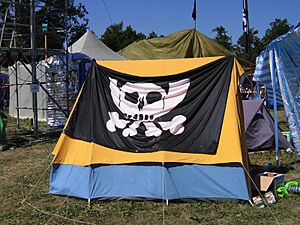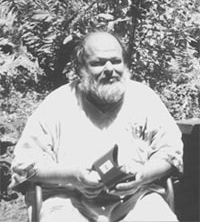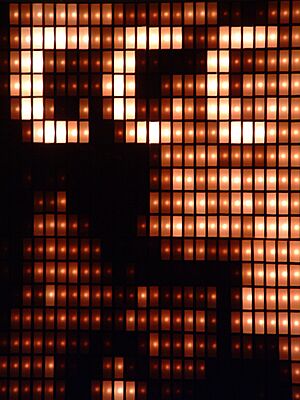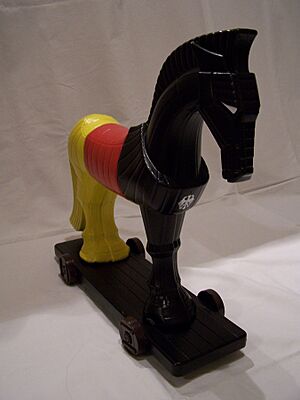Chaos Computer Club facts for kids

Chaos Computer Club Logo (Chaosknoten aka Datenknoten)
|
|
| Formation | 12 September 1981 West Berlin, West Germany |
|---|---|
| Type | NGO |
| Purpose | Computer security hacking |
| Headquarters | Hamburg, Germany |
| Location |
|
The Chaos Computer Club (CCC) is a large group of computer experts and enthusiasts, often called hackers, based in Europe. It has over 7,700 members. The club started in 1981 in Germany. It has local groups in many cities, especially where German is spoken.
The CCC sees itself as a "galactic community" that works for freedom of information. They believe everyone should have access to computers and technology. They also support using open-source software, which means its code is free for anyone to use and change. The CCC is known for being a very important group in German digital culture. They often lead discussions about digital rights and freedom.
Members of the CCC have shown many important computer security problems. They often speak out against new laws or products that might put people's privacy at risk. Important members of the CCC often help the German constitutional court as experts. They also organize campaigns and influence political decisions.
Contents
What the Chaos Computer Club Does
Regular Events and Gatherings
The CCC hosts the Chaos Communication Congress every year. This is Europe's largest gathering for hackers. In 2013, 9,000 people attended the event in Hamburg. By 2016, about 11,000 guests were expected, with many more watching online.
Every four years, the Chaos Communication Camp is held outdoors. It's a big event for hackers from all over the world. The CCC also used to hold a conference called SIGINT in Cologne, which focused on how digital technology affects society. Another large yearly event is the Gulaschprogrammiernacht in Karlsruhe, with over 1,500 participants. The Easterhegg is another yearly CCC event. It happens on Easter weekend and focuses more on workshops.
The CCC often uses the c-base station in Berlin for its events and meetings.
Publications and Education
The CCC publishes a magazine called Datenschleuder (which means data slingshot). It has been published since 1984. The Berlin group also makes a monthly radio show called Chaosradio. This show talks about different technology and political topics for two hours. It is broadcast on a local radio station and online.
Many CCC groups take part in a project called Chaos macht Schule (Chaos Teaches School). This project helps teach students, parents, and teachers about technology and how to use media safely.
CCC members also work in big tech companies and government offices. For example, Andy Müller-Maguhn, a spokesperson for the CCC, was part of the executive committee for ICANN (Internet Corporation for Assigned Names and Numbers) from 2000 to 2002.
CryptoParty Events
The CCC helps people learn about data privacy. Some of its local groups organize "CryptoParties." These events teach people the basics of cryptography (secret codes) and how to stay private online.
History of the Chaos Computer Club
How the Club Started
The CCC was founded in West Berlin on September 12, 1981. It was started by Wau Holland and others. They believed that information technology would become very important in how people live and communicate.
The BTX-Hack
The CCC became famous in 1984 for showing a big security problem. They showed how easy it was to get money from the German Bildschirmtext computer network. They made the system transfer about 134,000 German Marks to their club's account. The next day, they returned the money in front of reporters. Before this, the system's owner had said their system was safe, even after the CCC tried to warn them.
Karl Koch and Cyberespionage
In 1987, the CCC was connected to an international cyberespionage case. A group of German hackers, including Karl Koch, who was loosely connected to the CCC, broke into US government computers. They then sold computer code to the Soviet KGB. This event was shown in the movie 23.
GSM-Hack
In April 1998, the CCC successfully showed how to copy a GSM customer card. This showed a weakness in the encryption (security code) used by many mobile phone SIM cards at that time.
Project Blinkenlights
In 2001, the CCC celebrated its 20th birthday with an amazing light show called Project Blinkenlights. They turned a building in Berlin into a giant computer screen using lights. In 2002, they created a similar project called Arcade in France. In 2008, Project Blinkenlights also went to Toronto, Canada.
Schäuble Fingerprints Protest
In March 2008, the CCC got and published the fingerprints of the German Interior Minister, Wolfgang Schäuble. They even included the fingerprint on a special film in their magazine. Readers could use this film to trick fingerprint readers. This was done to protest against using biometric data, like fingerprints, in German ID cards and passports.
Staatstrojaner Affair
The Staatstrojaner (meaning Federal Trojan horse) was a computer program used by German police. It was secretly installed on a suspect's computer to monitor online communications. The German constitutional court had ruled that police could only use such programs for specific purposes, like monitoring phone calls, and for nothing else.
On October 8, 2011, the CCC studied the Staatstrojaner software. They found that the program could take control of the computer, capture screenshots, and run other secret code. The CCC said this went against the court's rules.
They also found many security problems with the program. It could be controlled over the internet, but the commands were not encrypted. This meant any computer with the software was open to attacks. The captured screenshots and audio files were encrypted, but very poorly, making the encryption useless. All the collected data was sent through a server in the United States, which was a problem because the data left German legal control.
The CCC's findings were widely reported in the German news. This program was even nicknamed R2-D2 because of a code string found in it. The German Interior Ministry said that the R2-D2 program was not used by the Federal Criminal Police Office. However, this did not mean it wasn't used by state-level police forces in Germany.
Phone Authentication Systems
The CCC has often warned people about how weak biometric identification can be. They believe in protecting people's data and privacy. They don't tell people not to share information, but they encourage better privacy protection and safer ways to browse and share online.
Apple TouchID
The CCC's team showed that they could unlock an iPhone 5S using a photograph of the user's fingerprint from a glass surface. They used "easy everyday means" to do this.
Samsung S8 Iris Recognition
Samsung claimed its Galaxy S8's iris recognition system was very safe. They said iris patterns are unique and almost impossible to copy. However, the CCC claimed they could trick this system. They used a high-resolution photo of the phone owner's iris and a contact lens to do it.
Fake Chaos Computer Club France
The Chaos Computer Club France (CCCF) was a fake hacker group created in 1989 in France. It was made by a government agency to watch and gather information about French hackers. The goal was to find hackers who might cause harm to the country. This fake group also worked with the French National Gendarmerie (police).
The CCCF had an online magazine called Chaos Digest. It published many issues between 1993 and 1993.
See also
- 23 (film)
- c-base
- Chaos Communication Congress
- Chaosdorf, a local CCC group in Düsseldorf
- Datenschleuder
- Digitalcourage
- Digital identity
- Hacker culture
- Information privacy
- Netzpolitik.org
- Project Blinkenlights
- Security hacker
- Tron (hacker)
- Wau Holland Foundation
 | Audre Lorde |
 | John Berry Meachum |
 | Ferdinand Lee Barnett |





